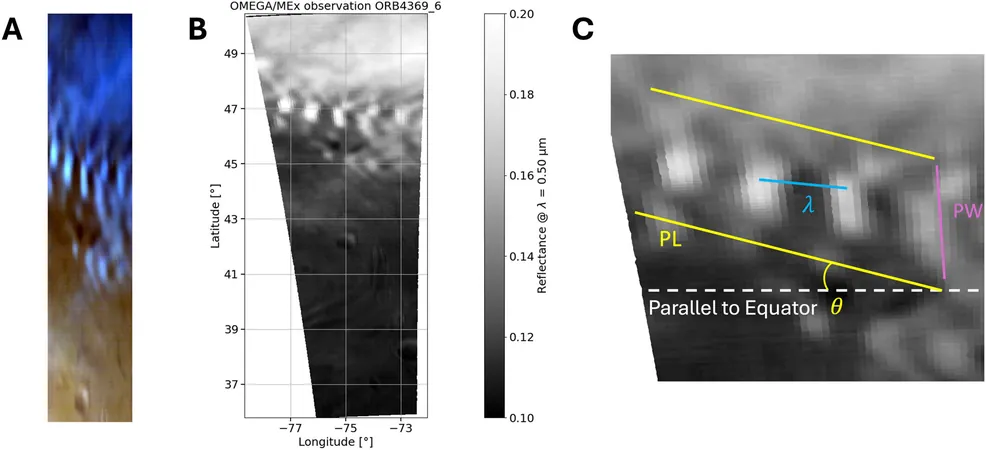
Unveiling Mars' Secrets: Groundbreaking Study Reveals Shocking Differences from Earth!
2025-03-25
Author: Siti
Introduction
In a groundbreaking development that shifts our understanding of the Martian atmosphere, researchers from the University of Lisbon have synthesized two decades of atmospheric observations of Mars into a single comprehensive study. Spearheaded by Francisco Brasil and Pedro Machado, this pivotal research has just been published in the esteemed Journal of Geophysical Research: Planets.
Understanding Atmospheric Waves
For those who might wonder what atmospheric waves are, think of them like ripples on a pond—these wave-shaped disturbances travel through a planet's atmosphere and play a crucial role in influencing its climate. The study titled “Atmospheric Gravity Waves in Mars' Lower Atmosphere: Nadir Observations From OMEGA/Mars Express Data” highlights these fascinating phenomena, revealing deeper insight into Mars' complex weather patterns.
Research Methodology
Utilizing data amassed by the OMEGA (Observatoire pour la Minéralogie, l'Eau, les Glaces et l'Activité) instrument aboard the European Mars Express spacecraft, the researchers meticulously analyzed a staggering 263 groups of atmospheric waves, delving deeply into 125 of these cases. Their investigation concentrated on three primary types of atmospheric disturbances: dry ice waves, water waves, and dust storms. An intriguing challenge they faced was sifting through hundreds of thousands of images to identify those with and without clouds—an arduous task given that clouds are infrequent and sporadic on the red planet.
Key Findings
This extensive study not only enhances our grasp of Martian climate but also underscores striking differences between Mars and Earth. “The disparities between the two planets are even more significant than we previously thought,” remarked Pedro Machado, who is among the leading researchers in this initiative. He pointed out a surprising asymmetry between Mars' southern and northern hemispheres, which had been underestimated in prior research.
Implications for Future Research
Moreover, understanding these atmospheric waves is essential for future explorations and potential colonization efforts, as climate plays a pivotal role in any long-term mission. This research marks a critical step forward in our quest to unlock the mysteries of Mars and could have implications for how we approach the study of climates on other celestial bodies as well.
Conclusion
With unanswered questions still surrounding Mars and the promise of future discoveries, this study is a clarion call for scientists and space enthusiasts alike: the secrets of our neighboring planet may be more complex than we ever imagined!


 Brasil (PT)
Brasil (PT)
 Canada (EN)
Canada (EN)
 Chile (ES)
Chile (ES)
 Česko (CS)
Česko (CS)
 대한민국 (KO)
대한민국 (KO)
 España (ES)
España (ES)
 France (FR)
France (FR)
 Hong Kong (EN)
Hong Kong (EN)
 Italia (IT)
Italia (IT)
 日本 (JA)
日本 (JA)
 Magyarország (HU)
Magyarország (HU)
 Norge (NO)
Norge (NO)
 Polska (PL)
Polska (PL)
 Schweiz (DE)
Schweiz (DE)
 Singapore (EN)
Singapore (EN)
 Sverige (SV)
Sverige (SV)
 Suomi (FI)
Suomi (FI)
 Türkiye (TR)
Türkiye (TR)
 الإمارات العربية المتحدة (AR)
الإمارات العربية المتحدة (AR)